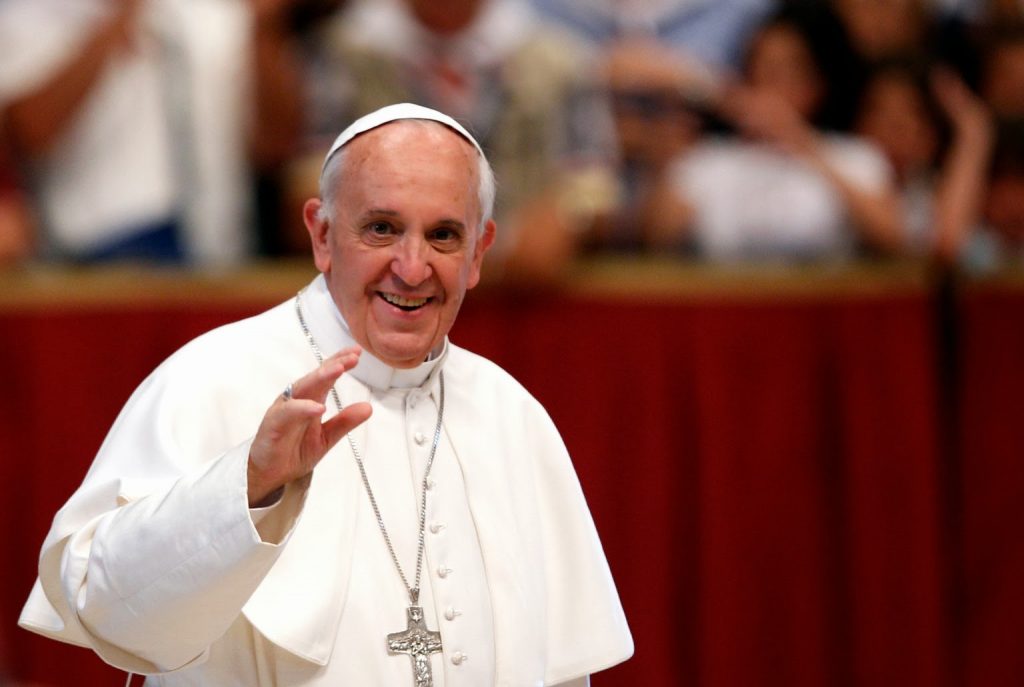During his pontificate, Pope Francis has ardently pleaded with the world to address the dire situation around the world’s food supply. Keeping in line with his simple and pragmatic nature, he proposes that everyone make one simple change that can make a major impact: reducing food waste.
“Throwing away food is like stealing from the table of the poor and the hungry,” he said.
Roughly one-third of the food produced in the world for human consumption every year — approximately 1.3 billion tons — is wasted. That is enough to feed all those who struggle or die from hunger. In the United States alone, 40% of all food is thrown away and never eaten.
“This culture of waste has made us insensitive even to the waste and disposal of food, which is even more despicable when all over the world, unfortunately, many individuals and families are suffering from hunger and malnutrition,” the Pope said.
“Once our grandparents were very careful not to throw away any leftover food. Consumerism has led us to become used to an excess and daily waste of food, to which, at times we are no longer able to give a just value.”
In an unprecedented move, Pope Francis personally spoke today at the UN Food and Agriculture Organization, where he marked World Food Day by calling for governments to work together to address the problem of hunger. Drawing a standing ovation, he said that population control is not the answer, but instead, a change in lifestyle and the use of resources.
“We cannot make do by saying ‘someone else will do it,” said Pope Francis
Right now, almost 900,000,000 people struggle with hunger every day. Every single second, a person dies from hunger. This is a tragedy of mind-numbing proportions. While many in the west throw food away without a second thought, people are literally dying. But, as Pope Francis said, you cannot expect someone else to address the issue.
To help the poor and hungry get access to life-saving nutrition, The Pontifical Mission Societies have created MISSIO, a new and innovative Catholic crowd-funding platform that allows you to directly assist Catholic missions and projects all over the world.
MISSIO allows you to search through life-giving and life-saving projects – ones providing for basic needs, others extending the Good News of the Gospel to remote areas, and still more, bringing the light of the Lord’s loving-kindness to those in the darkest circumstances. With MISSIO, you can choose one of these missions of Pope Francis and donate directly to them, knowing that 100% of your donation will go directly there. You can also share them on social media and reignite the discussion and remind people of these forgotten situations, so others can support the projects also.
Launched by Pope Francis himself, the MISSIO platform offers a direct connection to change-makers who work on the “front lines” making a difference for the poor and forgotten through direct, daily service.
The Early Church Was the Catholic Church
The Case for Catholicism - Answers to Classic and Contemporary Protestant Objections
Meeting the Protestant Challenge: How to Answer 50 Biblical Objections to Catholic Beliefs
MISSIO is powered by The Pontifical Mission Societies, the Catholic Church’s official support organization for overseas missions since 1822, providing for a global network of people who are making a difference for communities in need around the globe.
Remember the words of Isaiah 58:10:
If you offer your food to the hungry
and satisfy the needs of the afflicted,
then your light shall rise in the darkness
and your gloom be like the noonday.
Check out MISSIO today and start giving!
Credit: uCatholic
🙏 Your PayPal Donation Appreciated
Disclaimer
As an Amazon Associate, I earn from qualifying purchases. Thank you.
Note: While content aims to align with Catholic teachings, any inconsistencies or errors are unintended. For precise understanding, always refer to authoritative sources like the Catechism of the Catholic Church. Always double-check any quotes for word-for-word accuracy with the Bible or the Catechism of the Catholic Church.

